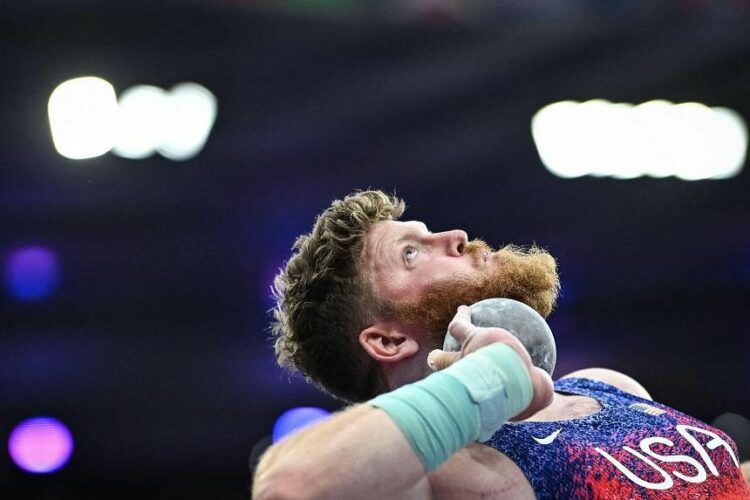The camera on the hovering helicopter intrudes into grief. On a boat at sea a young man lowers his head and weeps. A wonderful medal has been won, his nation delighted, but his personal ambition not met. Some months ago I’d interviewed kitefoiler Max Maeder about his competitiveness and you could tell it surged through him like an ocean current.
Now here it was on naked display.
That was Friday afternoon in Marseille. On Saturday evening he was back in Paris, his bronze medal in his suitcase, his face tinged with tiredness, generously willing to discuss those tears.
“I think, unfortunately I cannot overcome my natural desire to do well and I guess the fact that A, it didn’t go well and, B, the way it didn’t go well, against the people that it didn’t go well against, is all of the combination of that.
“Along with the fact of me having to wait for a while (till Los Angeles 2028) until I get to try again and quote, unquote, prove myself again, is probably what gutted me at the time.”
To gut something is to disembowel it. Not finishing where you want, even with a medal, can feel like that to an athlete. Max disappointed no one, but perhaps only himself. The standard he aspires for is up there where we can barely see it. He feels the gravitational pull of excellence and the pain when it eludes him.
Max’s tears at his bronze reflected the deep waters of his desire. We should clone it for the Olympics asks for nothing else. Toughness is the only password here. Ryan Crouser won his third consecutive shot put gold in Paris and then posted a video of himself back home in America. His dog watching, him throwing. Greatness never rests.
An athlete I wrote a book with, an Olympic shooting champion named Abhinav Bindra who was just awarded the Olympic Order, was stunned by what he saw in Paris. “Everyone’s working so much harder to be at their best. The level is just another level, it’s unbelievable.”
As the Singapore contingent returns home, this is what we must discuss. The level of toughness they tasted and the environment they experienced. What is the mental edge which elevates athletes? What calm do some find amid chaos?
We know how devotedly our athletes work, the hardship they wear and that their places were earned. As a collective they performed decently, yet the Olympics demands more. This is the harshest measuring tape on the sporting planet. It’s not just about polished skills but tuned minds. Shutting out the noise of a Games can’t just be done with headphones.
“Your skill goes out of the box,” explains Bindra. “For most athletes, apart from those naturally great, it’s hard to get everything together. It can become very overwhelming and you can’t force a performance.
“It’s incredibly difficult to cut out the distractions. Your flow flies out of the window. It’s mental toughness, but it’s more than that. It’s the courage to let go and let it happen. You’re trying to find a personal perfection on an imperfect day.”
Singapore has won Olympic medals and so we must remain optimistic even as we must be realistic. We may believe we are punching above our weight, but Dominica, with 72,000 people, has a gold. Singapore has the stadiums and intelligence, but we must build more leathery characters.
Sport is run by the old but we must listen to our young Olympians. The person in the arena has a feel no one else has. What were they ready for, where did they fall behind? How did Gan Ching Hwee in an intimidating pool of Katie Ledecky hit personal bests? It’s like compiling a small book on the secrets of grit.
We should ask Joseph Schooling to tell aspiring Olympians about how he walked the pool deck in 2016 with such confidence. And send gymnast Rebeca Andrade, who struggled through three anterior cruciate ligament tears to win six Olympics medals, an invitation to visit. Humility is learning from everyone.
We must work with sports psychologists, simulate finals (though tension isn’t easily replicated) and yank athletes out of comfort zones. Before Beijing 2008, a German coach decided the slightly nerdy Bindra needed to confront his fears. So he took him on a commando course.
Singapore athletes must travel widely, for this solitary wandering of the world builds resilience. Cotton wool anyway never helped anyone. Neither does being great only at training but not translating it into competition. In short, we have to train athletes for what the Olympics brings – variables, difficulties, noise, surprises and an excessive Noah Lyles leaping in your face.
All those at a Games are human. Tissue, blood, bone, talent. What separates them is tiny but crucial. The world is not unbeatable but all leaps require a sports culture with a rugged spirit of stubbornness. It is built by young men like Max. On a podium but smarting. His smile wide but his insides unfulfilled. Grateful yet hungry.
Source link : http://www.bing.com/news/apiclick.aspx?ref=FexRss&aid=&tid=66b837b805984bcfb04dd3b0ca07d87f&url=https%3A%2F%2Fwww.straitstimes.com%2Fsport%2Fthe-olympics-has-become-tougher-so-must-singapore-sport&c=11830758865292901953&mkt=en-us
Author :
Publish date : 2024-08-10 16:38:00
Copyright for syndicated content belongs to the linked Source.
